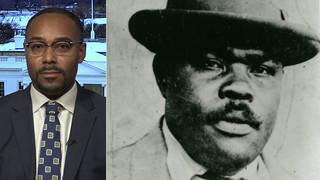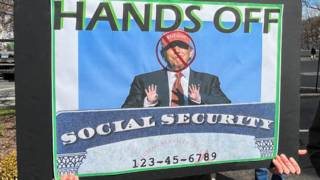
Benjamin Jealous, the president and CEO of the NAACP, joins us to react to the new audio recordings and documents released in the investigation of Trayvon Martin’s killing. The evidence indicates a fight occurred between Martin and his alleged killer George Zimmerman, but police determined the deadly encounter was “ultimately avoidable” if Zimmerman had not pursued Martin. An autopsy also shows Martin died from a single gunshot wound to the chest fired from “intermediate range.” Reacting to a recording of Martin’s girlfriend recounting her phone call with Martin moments before his death, Jealous says: “It’s absolutely heartbreaking to listen to his girlfriend, his childhood friend, talk about the experience of listening to him be hunted on the street just before he was killed. … It dramatizes for people the experience of millions of young people across this country every year when they are racially profiled, whether it’s by community watch volunteers or it’s by cops.” [includes rush transcript]
Transcript
AMY GOODMAN: To talk more about the Trayvon Martin case, we’re going to Florida. We’re joined by Ben Jealous, the president and CEO of the NAACP.
Ben, I’m not sure if that’s the first time you’ve heard this questioning of Trayvon’s girlfriend. Can you please respond?
BENJAMIN JEALOUS: It’s heartbreaking. It’s absolutely heartbreaking to listen to his girlfriend, his childhood friend, talk about the experience of listening to him be hunted on the street just before he was killed. And it really—I think it dramatizes for people the experience of millions of young people across this country every year when they are racially profiled, whether it’s by community watch volunteers or it’s by cops. I mean, in New York City last year, there were more stop and frisks, more racial profiling incidents of young black men in that city than there are young black men in that city. And I think that this—this, hopefully, will help people understand just how our young people feel, how their friends feel, when they’re humiliated, degraded, mistreated, sometimes even killed, simply because of their color.
JUAN GONZÁLEZ: And Ben, the other material that was released last night—again, unusual in these kinds of situations that so much of the investigative work is being released, even before trial occurs.
BENJAMIN JEALOUS: Yeah.
JUAN GONZÁLEZ: But your response to some of the other material that you’ve heard about?
BENJAMIN JEALOUS: You know, from what I’ve been able to read and go through, the most important thing that was released yesterday was the report that the top law enforcement officer on the scene, the lead investigator that day, said that this killing was—could have—said that there was no reason this killing should have happened, if Mr. Zimmerman had stayed in his car, said that Mr. Zimmerman should have been charged for killing Trayvon, and that that lead investigator, that top law enforcement officer on that scene that day, that his judgment was not respected by his superiors, who—and this gets down to why we need a different chief in Sanford, that his superiors said, “No, we know that you think that Mr. Zimmerman should be charged, but we say, no, he should not be charged.” And that’s absolutely disturbing and outrageous that you would have a dead teenager on the ground, that the lead investigator would say that his killer should be charged, and that the superiors would say, “No, don’t charge him,” and then they would go on to not even investigate it, not even knock on the door 70 feet away where his father was or call back that phone where his girlfriend had just listened to him be hunted down on the street.
AMY GOODMAN: Following up on these recordings that have been released, we wanted to play a few more. These are the audio recordings police released last night of three witnesses who gave conflicting accounts of what they heard in the moments before George Zimmerman fatally shot Trayvon Martin. We’re going to begin with two women who were in a house close to the scene of the shooting in Sanford.
WITNESS 1: First of all, I was in the kitchen, making some coffee for me and my friends, and I had my window half up, and I hear somebody crying, like a young boy crying. So by the time—me and my friends, we hear like a shot.
WITNESS 2: Gunshot.
WITNESS 1: Gunshot.
POLICE OFFICER: OK.
WITNESS 1: But, I mean, I thought it probably was something, kids, you know, playing with something, so I just walked out to my porch, and I saw the two guys. I mean, it was very dark. It was night, and most of the houses haven’t turned on the lights. So I saw two persons, one lying on the floor and the other one on top of him.
WITNESS 2: I mean, that little kid was so skinny compared to him.
POLICE OFFICER: Exactly, yeah. That’s the impression that we all got. As far as—
WITNESS 2: And I can tell you there was no fighting going on at the time that the gun went off, because we were both in the kitchen making coffee, the window was open. There was no fighting. And the fight that happened started way down the sidewalk, because the person on the very end of this block is the one who called the police originally because the fight broke out. Now the kid got shot way down here, you know, five doors down. So I know they were not physically fighting at the time that gun went off, when we heard the shot, and the kid hit the ground.
WITNESS 1: Yes.
AMY GOODMAN: While the two women said Trayvon Martin and George Zimmerman were not fighting at the time of the shooting, another local resident gave a conflicting account.
WITNESS 3: There was a black man with a black hoodie on top of either a white guy or—now that I found out, I think it was a Hispanic guy with a red sweatshirt on, on the ground, yelling out, “Help!” And then, you know, I tried to tell him, you know, “Get out of here,” you know, “Stop,” or whatever. And then the one guy on top in the black hoodie was pretty much just throwing down blows on the guy, kind of MMA-style.
POLICE OFFICER: Ground-and-pound, like that?
WITNESS 3: Yeah, like a ground-and-pound, on the concrete at this point. So at this point I told him I was calling 911. I locked my door, went inside, heard a pop—never heard a gunshot before, so I didn’t know if it was a rock or something like that. We ran upstairs. As soon as I got upstairs, I looked down below, and then I saw the guy in the black hoodie pretty much just laid out on the ground.
AMY GOODMAN: Again, these are recordings that were released by the police in this trove of hundreds of audio recordings, photographs and police documents. Ben Jealous is joining us from Miami, Florida, not that far from Sanford, where Trayvon Martin was killed. Ben, your response as you listen?
BENJAMIN JEALOUS: Sure. Yeah, look, this and a bunch of information came out yesterday. And you go through all of it, and what hasn’t changed is the basic facts that we know, that George Zimmerman is somebody about whom there were many complaints that people thought he had treated them in a way that was racist. George Zimmerman is somebody about whom there were many complaints that people said he was a bully. George Zimmerman is somebody who had called the cops multiple times that year, always about a young black man that he thought was suspicious. George Zimmerman was somebody who was told to stay in his truck that day by the cops whom he called, and he chose to get out with a gun and track down a young man on the street who was trying to get away from him because he was afraid of him. And that young man is dead as a result.
It’s not surprising to hear that local residents have different perceptions. We know that many of them knew Mr. Zimmerman, because he was their neighbor. And some of them indeed may be trying to, you know, help with his defense by trying to skew the story this way or that. But the basic facts haven’t changed. Trayvon Martin is dead, an innocent teenager. An innocent teenager is dead because a man with a gun who was told by the cops to stay in his car chose to get out with the gun and hunt down that young man on the street.












Media Options